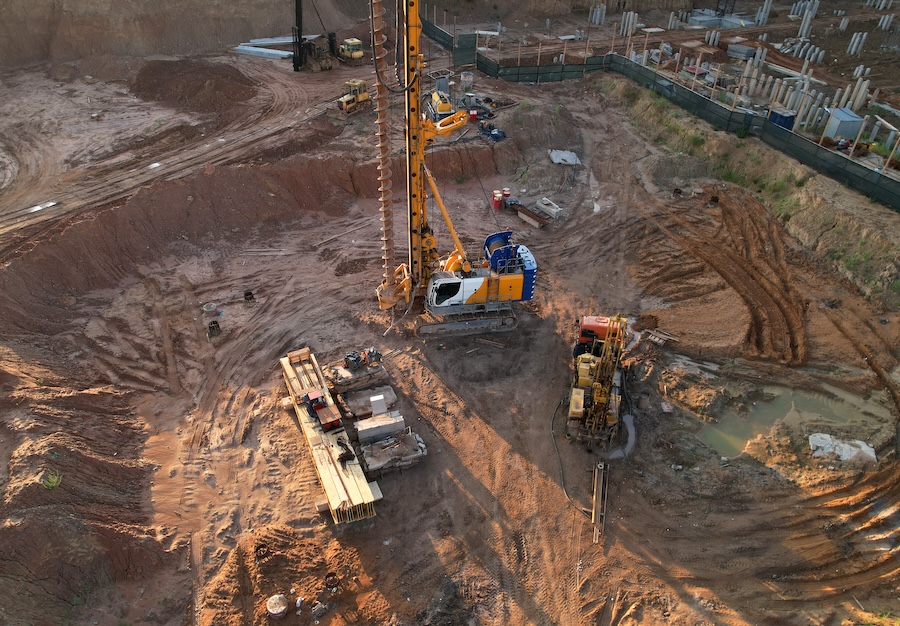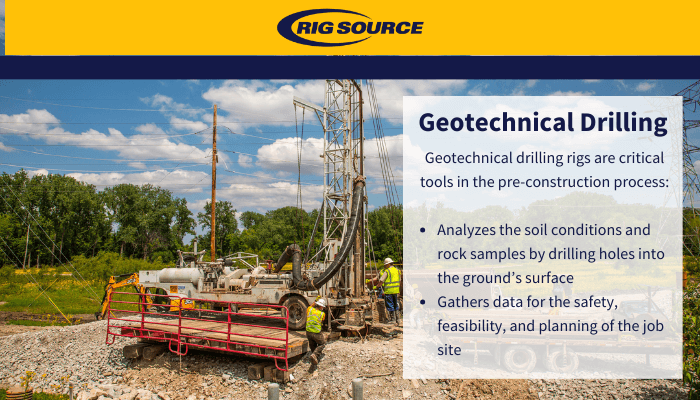The Importance of Geotechnical Engineering in Resolving Ecological Obstacles and Enhancing Building And Construction Security
Geotechnical design offers as a keystone in the intersection of ecological stewardship and building safety and security, giving vital understandings right into the actions of soil and rock under various problems. This discipline not just addresses pressing ecological obstacles such as soil erosion and groundwater defense yet additionally improves the robustness of infrastructure against all-natural hazards. By executing strategic site investigations and customized mitigation steps, geotechnical engineers play an important function in safeguarding both human lives and ecological integrity. The complexities of these challenges elevate vital questions concerning the future instructions of this area and its implications for sustainable growth.

Duty of Geotechnical Design
Geotechnical engineering plays an essential function in the style and construction of framework by dealing with the habits of soil and rock products under numerous problems. This field of engineering is crucial for recognizing the communication in between structures and the ground, which includes establishing the load-bearing ability of dirt, analyzing stability, and anticipating possible negotiation or failure.
Geotechnical designers are in charge of conducting website examinations, which entail tasting and screening soil and rock to collect information on their chemical and physical properties. This details is important for designing structures, maintaining walls, and various other earth-retaining structures that make certain safety and security and longevity. Geotechnical engineering informs the option of appropriate construction methods and products, thus reducing dangers linked with dirt habits.
Furthermore, the integration of geotechnical design principles right into urban preparation and environmental management is essential for addressing difficulties such as ground contamination and groundwater management. By recognizing geotechnical factors, engineers can create sustainable solutions that improve the strength of facilities against natural risks, while also promoting environmental stewardship. Eventually, the role of geotechnical design is vital for attaining safe, sturdy, and eco mindful building and construction methods.
Dirt Erosion Mitigation
Soil disintegration presents a considerable threat to both ecological stability and infrastructure integrity, impacting roughly 24 billion lots of abundant dirt shed each year worldwide. This sensation is exacerbated by factors such as logging, urbanization, and poor farming techniques. Geotechnical design plays an essential role in establishing reliable dirt erosion mitigation methods that guard both the setting and construction projects.
One technique entails the execution of disintegration control approaches such as plant life planting, which maintains soil through origin systems. Furthermore, the building and construction of keeping wall surfaces and balconies can properly minimize surface overflow and safeguard vulnerable areas from erosion. Correct water drainage style is additionally essential; it lessens water accumulation and guides excess runoff far from important frameworks.
Additionally, geotechnical engineers use dirt stabilization methods, such as the application of geotextiles and eco-friendly floor coverings, to boost dirt communication and prevent deterioration - about geotechnical engineering. Regular tracking and evaluation of erosion-prone sites enable prompt interventions, making sure long-term sustainability. By incorporating these strategies, geotechnical design not only alleviates the impacts of soil disintegration however likewise contributes to the resilience of infrastructure against ecological challenges, inevitably fostering a more secure and a lot more lasting built setting
Groundwater Defense Methods
Groundwater offers as a vital resource for drinking water, agriculture, and industrial see post processes, making its defense crucial for ecological sustainability and public health and wellness. Efficient groundwater defense methods are crucial in reducing contamination dangers and making certain the durability of this resource.

Normal tracking of groundwater quality is likewise vital, enabling early discovery of contamination resources and promoting prompt removal initiatives. Employing advanced innovations, such as geophysical surveys and remote sensing, help in identifying possible threats to groundwater books.
In addition, public education and stakeholder engagement are crucial, cultivating neighborhood assistance for groundwater protection efforts. geotechnical specialist. By integrating governing measures, technological developments, and community participation, we can produce a thorough framework that safeguards groundwater sources while advertising sustainable advancement and building and construction techniques
Landslide Threat Management
Landslides posture significant dangers to both human safety and security and infrastructure, making effective risk management techniques crucial. Geotechnical design plays an essential duty in identifying, analyzing, and mitigating landslide risks. A thorough understanding of incline stability, soil technicians, and hydrology is important for establishing reliable threat administration plans.
The first action in landslide danger administration entails extensive site investigations, which include geological mapping and soil testing. These investigations aid designers assess the capacity for that site landslides by recognizing critical factors such as incline angles, dirt composition, and water content. Using advanced innovations such as remote sensing and geophysical surveys can improve the precision of these evaluations.
As soon as risks are determined, proper reduction steps can be carried out. These might include engineering remedies such as maintaining walls, drainage systems, and slope stabilization techniques. Moreover, keeping an eye on systems should be established to detect indicators of ground movement and adjustments in water levels, permitting aggressive treatments.

Enhancing Construction Safety And Security
Building and construction websites often offer a myriad of threats that can jeopardize employee safety and task integrity. Geotechnical engineering plays a crucial duty in enhancing construction security by providing necessary insights into subsurface problems. Via thorough dirt and rock analysis, geotechnical designers can recognize prospective risks, such as dirt instability, groundwater problems, and seismic vulnerabilities, which might jeopardize the security of construction tasks.
Applying geotechnical solutions, such as appropriate foundation layout and using retaining frameworks, alleviates these risks significantly. These solutions not only make certain the stability of the structures being developed but additionally produce a more secure working environment for construction employees. Furthermore, strenuous tracking and assessment of site problems throughout the building process are important. Utilizing innovative technologies like ground-penetrating radar and inclinometer systems enables real-time data collection, allowing for prompt interventions when dangers are detected.
In addition, fostering a culture of security via training and adherence to established safety methods further enhances building and construction site safety and security. By integrating geotechnical know-how into the preparation and execution phases, construction projects can accomplish greater safety and security standards, ultimately protecting employees and making certain effective project completion.
Final Thought
In verdict, geotechnical design serves as a critical technique in taking on environmental obstacles and promoting construction safety. Through effective dirt erosion mitigation, groundwater defense strategies, and landslide risk monitoring, geotechnical engineers add to the advancement of durable facilities.
Geotechnical design offers as a cornerstone in the intersection of environmental stewardship and building and construction safety, providing essential insights right into the actions of soil and rock under numerous problems. Geotechnical design educates the choice of ideal construction approaches and products, thereby reducing risks connected with soil habits.
Geotechnical design plays a pivotal role in establishing effective soil erosion mitigation approaches that safeguard both the setting and building projects.
Furthermore, geotechnical engineers utilize dirt stablizing methods, such as the application of geotextiles and naturally degradable floor coverings, to improve dirt communication and protect against deterioration. Through extensive soil and rock evaluation, geotechnical designers can recognize possible threats, such as dirt instability, groundwater issues, and seismic susceptabilities, which might endanger the safety and security of construction activities.
Comments on “Everything You Need to Learn About Geotechnical Engineering for Your Following Job”